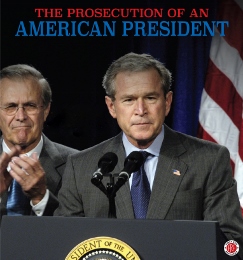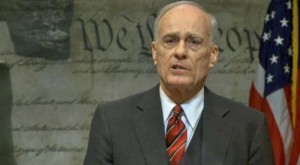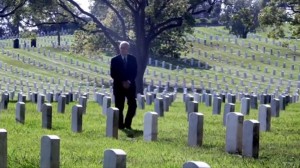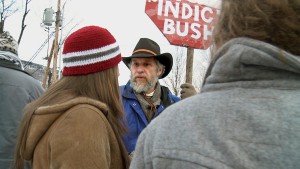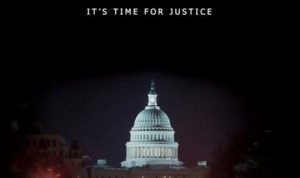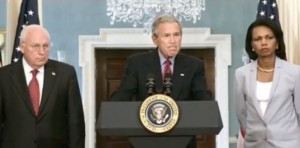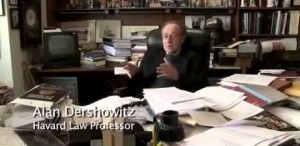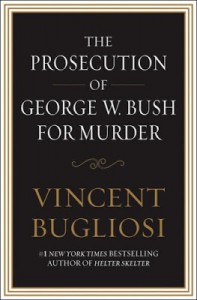THE CAREER OF AN AMERICAN CELEBRITY
Providing no evidence unavailable in a half-dozen better documentaries on the Bush administration’s invasion of Iraq, the 2012 The Prosecution of an American President serves as a 100 minute advertisement for Vincent Bugliosi’s 2008 book The Prosecution of George W. Bush for Murder. One may agree with its themes and still reject the incompetence of their illustration, and the blatant marketing that frames them.
The film spends its first fifteen minutes establishing its author and star’s bona fides. It resurrects Bugliosi’s claim, called “unsupported” by the Los Angeles Times when he made it in the 1970s, to 105 convictions in 106 cases as a prosecutor. It’s certain that as an assistant Los Angeles D.A., Bugliosi famously put away Charles Manson; later, as a criminal defense lawyer, he got Stephanie Stearns acquitted in a sexy yacht-murder case. He abandoned his political aspirations after some near misses. Since 1974, when he made a fortune co-authoring (with Curt Gentry) a book on the Manson case, Helter Skelter, much of his work has been literary. This persona is twofold: long-winded true crime writer and self-aggrandizing social critic.
This gothic American crank boasts wordy tomes taking obvious or obtuse positions: In 1995, he asserted that O.J. Simpson was guilty (Outrage: The Five Reasons Why O.J. Simpson Got Away with Murder); 2011’s Divinity of Doubt: The God Question reveals his judgment that God may not exist. In 2007 he took over a million words to agree with the Warren Commission’s finding that Lee Harvey Oswald acted alone (Reclaiming History: The Assassination of President John F. Kennedy). It’s the record not of a crusader but of an ambulance chaser.
This lack of imagination of course translates to a banality in his arrangement of preexisting circumstance. To view The Prosecution of an American President as other than an infomercial, one must blink or turn away. The screen is packed with heroic images of Bugliosi, or of books he has written, or of talking heads speaking about the importance of the institution called Vincent Bugliosi. As directed by the extremely deferential and very obviously for-hire David A. Burke and Dave Hagen, the documentary sets its sights very low. Burke and Hagen intercut patriotic graphics, horrific war imagery, and shamelessly exploitative interviews with grieving wives and parents, with a speech given by Bugliosi to a few UCLA law students. Staged for the film, mock prosecution arguments are delivered from a podium backed by a blown-up detail of the Constitution and more American flags than I have ever seen standing behind a single speaker. It’s at least five, maybe ten.
Bugliosi’s speech is a point-by-point exposition of the validity of charging George W. Bush with murder. Not the hundred thousand Iraqi murders Bugliosi claims he can lay at Bush’s door via the invasion, but at least those of the American armed forces who died there. As in earlier films like Michael Moore’s 2004 Fahrenheit 9/11 and Charles H. Ferguson’s 2007 No End in Sight, the not finding of (1) a clear connection between Saddam Hussein and the events of 9/11, or (2) WMDs, is front and center. The single unique element of this film is that a strident fellow with a voice like a mosquito whines the story from a podium. It’s an overtly righteous imitation of a man actually hopeful that a real prosecutor, from one of the states that spawned our four and a half thousand war dead, will decide to charge a former president with willful, malice-aforethought homicide for invading the wrong country. Much of his argument stems from the fact that Bush smiled a lot during the war. Bugliosi has pictures. Look at them. Murderer.
There is something desperately cheap about a guy pretending to be an intellectual who would hold up televangelist Pat Robertson as a character witness against Bush. (Yes, that’s funny, but Robertson doesn’t appear; it’s an interview alluded to in an aside by the inexhaustibly voluble Bugliosi.) And the fantasy elements of his logic are not mitigated by the self-conscious Quixotism. In a running “interview,” the author mentions how impossible it was to get the book reviewed. We are given to understand that this difficulty arose through the influence of the Bush administration. It does not apparently occur to Bugliosi that people might have other reasons for not wanting to read his writing. (The book turned out to be fairly successful regardless of any draconian efforts by the military-industrial complex.)
Were Bush (and Condoleeza Rice and Colin Powell and Darth Vader) guilty of mendacity? Surely. They are politicians. But “he’s not going to get by with it if I have anything to say about it,” says the former L.A. prosecutor. You may decide whether you’re going to let Vincent Bugliosi get away with rehashing information which, if you’re at all interested in the subject, you already know better than he can tell you. Legendary defense attorney Alan Dershowitz appears early in the film to say that he thinks highly of Bugliosi as a prosecutor; but he says it in counterpoint to the fact that Bugliosi is nuts to think he’s got a case here. The look on Dershowitz’s face is more eloquent than the long, long argument that fails to rebut it.
The Prosecution of an American President
NAFTC Studios, First Run Features
101 minutes | documentary | U.S.A. | color | 2012
available on DVD and iTunes October 7, 2014
for info, visit www.firstrunfeatures.com
